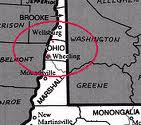This story about Ohio County in West Virginia was published by Casey Junkins on July 23rd in the Wheeling Intelligencer and has appeared in other papers:
Sulfur dioxide, carbon monoxide and formaldehyde are some of the chemicals Chesapeake Energy is likely to pump into the air in Ohio County from its numerous drilling sites, company information states.
Earlier this year, Chesapeake officials confirmed plans to build local compressor stations that may release these and other chemicals into the atmosphere. Now, the company is identifying “potential to emit” levels for several potentially hazardous materials from its well drilling sites.
“The West Virginia Department of Environmental Protection has primacy to regulate air emissions from all industries, including oil and gas operations, to protect public health and the environment. Chesapeake works with the agency on a regular basis to comply with, and usually exceed, the requirements,” said Stacey Brodak, Chesapeake’s senior director of corporate development.
Chesapeake Energy is again drilling at the Minch pad in Ohio County, where the company plans to extract natural gas from beneath Oglebay Park. The company plans to frack under the park before the end of this year.
In four separate legal advertisements, Chesapeake is seeking permits from the West Virginia DEP’s Division of Air Quality to release several pollutants from four of its Ohio County well sites. The notices state that the DEP intends to issue the permits, but is providing public notice to allow for comments and discussion.
The well sites are situated in the areas of:
– Gantzer Ridge Road on the south side of Interstate 70, near The Highlands.
– Stone Church Road, near the Elm Grove section of Wheeling.
– Garrison Road, near West Liberty.
– Laidley Run Road in the southeastern part of the county.
Fact Box: MAKE A COMMENT
Those wishing to comment on the four Chesapeake Energy air quality permits for Ohio County natural gas drilling sites have until 5 p.m. Aug. 15 to submit them to: Roy Kees, P.E.; West Virginia Department of Environmental Protection; Division of Air Quality; 601 57th St., SE; Charleston, WV 25304.
“It is vitally important to understand that the emissions listed in the legal notice are representative of a conservative potential to emit level typical of the air permitting process and not necessarily indicative of the actual annual emissions of the site,” Brodak said. “Emissions levels vary depending on several factors including gas composition, well head pressure, volume of condensate and the production equipment.”
The amounts of the particulates that may be released at the four sites slightly vary. The carbon monoxide projections, for example, range from 40 tons per year to 61.5 tons per year to be released from a single site.
The potential to emit levels for sulfur dioxide and formaldehyde are substantially less than those for carbon monoxide.
Chesapeake is also now awaiting a DEP permit to drill on property owned by the Park System Trust Fund of Wheeling, roughly 1,300 feet from Wheeling Park High School. So far, at least 20 people have sent objections to the DEP regarding the well site, as have the Ohio County Board of Education, the Ohio County Commission and the city of Wheeling.
So far, Chesapeake officials have only said that they have engaged with the parties affected by the drilling site, including the Ohio County Board of Education members and superintendent’s office. They also emphasize the well site will be more than twice the 625-foot legal limit away from an “occupied dwelling,” as defined by state law.
In addition to the pollution from the well sites, Chesapeake also will release emissions from its local compressor stations. One of these is just off the Interstate 70 Dallas Pike exit near The Highlands, while another is in the Sand Hill area near the Marshall/Ohio County border.
Chesapeake, in a legal advertisement earlier this year, confirmed the “potential to discharge” the following amounts of these materials on an annual basis from the operations at the compressor stations: carbon dioxide – 93,800 tons; nitrogen oxides – 82.96 tons; carbon monoxide – 16.87 tons; methane – 86.64; carbon dioxide equivalent – 95,667 tons; benzene – 0.33 tons; and formaldehyde – 3.22 tons.

